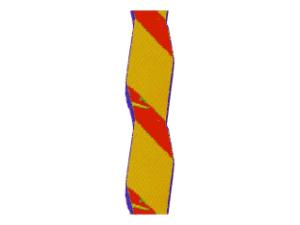HPC Research Highlights
Atomistic Simulation of Hydrogen Embrittlement in Pipeline Steels

Modern steels are complex engineering materials as they contain grains of different microstructural constituents but also defects such as vacancies, dislocations, and grain boundaries. Hydrogen atoms interact with these defects, affecting the overall mechanical properties. The macroscopic observations of hydrogen embrittlement are the consequence of events taking place at the atomic level. Due to its low solubility in iron and high mobility, hydrogen cannot be detected by most experimental techniques. This makes computational methods, such as molecular dynamics simulations, viable alternatives to study hydrogen embrittlement. Simulations consisting of several million atoms can be performed by using the high performance computing service Rocket.
An early stage of this research is to understand the mechanical properties of steels in the absence of hydrogen. Carbon atoms are known to have important strengthening effects in steel. However, due to the very low solubility in ferrite (solid solution of C in Fe), C atoms are usually neglected from most molecular dynamics simulations published in the literature. Molecular dynamics simulations comparing the mechanical behaviour of pure iron and ferrite (the solid solution) suggest that even at such low concentrations (0.008 %), there is a noticeable difference in the tensile strength. The main reason for such increase in strength is the pinning of dislocations. This study suggests that in order to aspire to more realistic scenarios, carbon atoms should be included in simulations of low carbon steel.
Publications:
Izquierdo-Sánchez, A. A., Oila, A. & Charles, A. Atomistic simulation of tensile tests on iron and ferrite. Materalia. 2020, 13, 100822 https://doi.org/10.1016/j.mtla.2020.100822
For further information please contact:
Angel A. Izquierdo Sanchez
PhD student
School of Engineering, Newcastle University
A.Izquierdo2@newcastle.ac.uk
Last modified: Wed, 21 Oct 2020 14:07:06 BST
